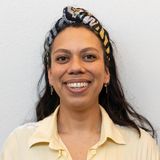In Designing Cities for All, we take a deep dive into (re)designing just cities, together with designers, scientists, experts, educational institutions, ánd six Fellows. Inequality and exclusion are also affected by how we define our digital world. Tech giants are encroaching on our streets in very tangible ways, disrupting our neighbourhoods. This particular series is curated by Techno Futurist Galit Ariel, who wants to evoke new ways to hack the city (for good). In this first episode, we talk about digital identity, the issues with using data and statistics in urban planning and design, and social data for all. Who gets to design the city? And who gets to participate and who doesn’t?
Lisa Talia Moretti is an award-winning Digital Sociologist and Tech Ethics Activist. She is an Associate Lecturer in the Institute of Management Studies at Goldsmiths (University of London), a Visiting Lecturer at Cardiff University in the School of Journalism, PR and Cultural Studies, and currently working at the Ministry of Justice in the UK on projects like The Power of Attorney. For more than a decade, Lisa has researched and written about the relationship between technology, information, and society, and has presented keynotes and run workshops to global audiences from a wide range of business backgrounds on the impact, opportunities, and challenges of emerging technologies. Passionate about diversity in all its forms, Lisa believes that the key to unlocking the true value of advanced technologies lies in making them democratic and accessible for the many, not the few. Lisa will present some lessons today about digital identity, how to build an inclusive digital identity service, and what improved data governance looks like.
As Waag’s research director, Sander van der Waal is responsible for its research agenda. His focus is on ensuring Waag’s research contributes to lasting positive change locally in Amsterdam, nationally in The Netherlands, and on the European level, in line with Waag’s principles of openness, fairness, and inclusivity. Earlier, Sander was lead of the Future Internet Lab at Waag, working to ensure that human values are core to how technology and data are designed and deployed in society. According to Waag, digital public spaces would ensure the same rights and values that we hold dear in our physical spaces. They should be open, democratic, and sustainable. By design, such environments are inclusive for everyone and transparent about how personal and usage data is stored and processed, offer possibilities to change how they work, and do not exploit people for economic gain or cause harm to our planet.
Galit Ariel is a TechnoFuturist, author, and creative who explores the wild and imaginative side of immersive technologies. She is the author of Augmenting Alice – The Future of Identity, Experience and Reality, a book that explores the way Augmented Reality’s diffusion will shift core paradigms and interactions related to culture, space, embodiment, agency, and ethics. Through her art/tech futures agency Future Memory Inc. she helps organisations and policymakers shape their technological futures and develop immersive experiences, interaction tools, and narratives. Galit is currently conducting her research-by-design Ph.D. at York University, exploring paradigms of immersive presence. In her DCFA Fellowship, Galit will explore the impact of tech-infused urban environments on agency, representation, and self-expression, evoking new ways to hack the city (for good).

Sleepwalkers - If data doesn't make you think of a new world order, it should. AI is enabling wholesale surveillance, and changing the landscape in countries. With a.o. Lisa Talia Moretti. >>

Briarpatch - The battle against Big Tech has now decisively emerged as a new front in the fight for the right to the city

The Guardian - Facebook, Google and Amazon have not just colonised the internet: their hubs, campuses and offices are taking over huge sections of cities around the world. But campaigners from New York to Toronto and Berlin are fighting back. >>

NRC - De digitale samenleving is te belangrijk om alleen aan de markt over te laten, weten Marleen Stikker en Sander van der Waal. >>











